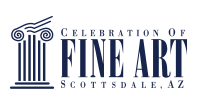Give David Jackson a brush and a platform to teach, and he’s a happy camper. He tapped into this happy place at an early age. At just 12 years old, he knew he was going to be an artist. And over the years, he’s discovered how to incorporate several of his other passions––teaching, travel and nature––into his chosen profession.
David taught art––everything from painting to jewelry making––for nearly three decades and has since gotten to watch as many of his students followed in his footsteps, becoming successful artists in their own right. And while he loves to teach others with a penchant for art, David also continually educates himself––experimenting with new techniques, mediums and subjects.
One look at his art and it’s easy to see what his third love is: nature. While he’s out exploring, he’s continually composing in his mind’s eye––a by-product of being an artist. And it’s not uncommon for many of his experiences to then end up on a canvas, which is part of what David loves most about the creative process.
Read on or watch the video below to learn more about David Jackson and his journey as a professional artist and teacher.
When did you know art was your calling?
When I was 12 years old. I was just a young whipper-snapper kid. I liked to draw pictures and I had an opportunity to do a competition for a correspondence course. I got hooked up doing that for two years when I was 12 and 13. And I decided, I was going to be an artist at that point. Then I went into teaching for 27 years and that’s what really got me going because I loved teaching and it was reinforcing all the things I needed to learn as an artist.
How did your journey progress?
I taught art––pottery, jewelry, sculpting, you name it. I did all aspects of art. So it was kind of a well-rounded experience, but painting was my passion––primarily watercolors for nearly 20 years. Then I graduated from watercolors to oils, and now I’m dancing around with the brush and painting the oils.
I was selling my work while I was teaching. I was always a professional artist, which was kind of cool because I think the kids I taught respected me more because I was an artist and I always had art going on for them to see. They could see the bronze sculptures I did for other colleges and high schools. I would work on them in the school where kids could see the process.
It worked out really cool because I love both––teaching and art. And I’ve gotten so many kids that are artists out there now. It’s so cool. I’m more excited about seeing kids that I’ve taught throughout the years that are now sculptors, painters, potters and jewelers. It’s like a legacy of my best friends.
What do you love most about creating art?
There are so many aspects of the creative process. As an artist, as your mind develops, you learn to look at things differently. You look at things kind of through an artist’s mind. You’re composing and looking at things that make you smile. I may look at something and say, “Wow, that would look good on canvas.”
How do you keep yourself challenged?
I think some artists get stuck in doing something that they’re comfortable with and they don’t go beyond that. There are some that push themselves to new things, like switching from watercolors. I was so comfortable with watercolors but I wanted the challenge of going bigger, adding more texture, and playing with a palette knife. So I switched to oils. Then going from being very tight and meticulous to loosening up and learning to say more with less. Rather than paint every little limb in a tree or every blade of grass, I come in with a few brushstrokes and it says what it’s supposed to say. That was a challenge–––that’s not just something that came easy. I had to work at it. I’m still working at it and someday I’ll get it.
What brings you back to the Celebration of Fine Art?
Everybody that comes in here has a smile. You can’t help but enjoy being around all of the art. And then you get to rub shoulders with some of the best artists. And what a joy that is.
Over the years that I’ve done this, the sales are good and the painting is awesome. But the people you meet and friendships you make––you meet some of the coolest people on the earth––and they love your work, and that’s the coolest thing right there. They’re paying you a compliment. And they’ll even pay money to put it on their walls! I think there’s a point where you’re comfortable with the sales, but you’re always enjoying the people. When you enjoy that part of it, everything else falls into place. I like the positivity of the camaraderie of the people––the whole thing is just a neat experience for all of us.

